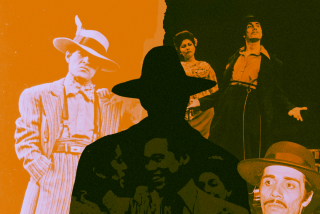Their timing is just perfect ... as usual
- Share via
These are the laws of my administration:
No one’s allowed to smoke
For the record:
12:00 a.m. Dec. 8, 2004 For The Record
Los Angeles Times Wednesday December 08, 2004 Home Edition Main News Part A Page 2 National Desk 1 inches; 47 words Type of Material: Correction
Marx Brothers DVDs -- An article in Sunday’s Calendar section about Universal Home Entertainment’s digitally remastered boxed set of Marx Brothers DVDs said that “Duck Soup” had not been released previously on DVD. All the films in “The Marx Brothers Silver Screen Collection” have been released individually.
For The Record
Los Angeles Times Sunday December 12, 2004 Home Edition Sunday Calendar Part E Page 2 Calendar Desk 1 inches; 45 words Type of Material: Correction
Marx Brothers DVDs -- An article last Sunday about Universal Home Entertainment’s digitally remastered boxed set of Marx Brothers DVDs said that “Duck Soup” had not been released previously on DVD. All the films in “The Marx Brothers Silver Screen Collection” have been released individually.
Or tell a dirty joke
And whistling is forbidden.
If chewing gum is chewed
The chewer is pursued.
And in the hoosegow hidden.
If any form of pleasure is exhibited
Report to me and it will be prohibited.
I’ll put my foot down, so shall it be.
This is the land of the free.
-- “Just Wait ‘Til I Get Through With It” by Bert Kalmar and Harry Ruby
Sung by Groucho Marx in “Duck Soup”
*
Over the last couple of years, I’ve thought often of “Duck Soup,” the four Marx Brothers’ 1933 comedy of inept government and arbitrary war. The mythical country of Fredonia, over which Groucho Marx improbably presides in that film, was beginning to feel a lot like home. I felt the need to see it again; there is a certain kind of humor that works like homeopathy -- that fights madness with madness. If I were in charge of television, I would broadcast it twice daily.
For reasons best known to accountants, it has taken until now for the film to come to DVD, but come it has, as the crowning glory of “The Marx Brothers Silver Screen Collection,” a new set from Universal that finally brings to disc the Marxes’ first five -- and to my mind, best -- films: charting their quick mastery of the medium from the stage-bound translations of their Broadway shows “The Cocoanuts” (1929) and “Animal Crackers” (1930), to the hyperkinetic farce of the shipboard “Monkey Business” (1931), the college-set “Horse Feathers” (1932), with its dancing bewhiskered dons; and finally “Duck Soup,” in which a declaration of war is turned into a minstrel show: “They got guns, we got guns, all God’s chillun got guns.” The film, now largely regarded as their masterpiece, did so poorly on its release that it ended the brothers’ relationship with Paramount, despite their having made the cover of “Time” just the year before, which just goes to show you.
At the same time, Universal has also released “W.C. Fields: Comedy Collection,” a box of five films that includes the essential “It’s a Gift” (like “Monkey Business” and “Horse Feathers,” directed by Norman McLeod), and “The Bank Dick,” along with “My Little Chickadee,” more of a vehicle for Mae West than for Fields; “You Can’t Cheat an Honest Man,” featuring Edgar Bergen and Charlie McCarthy; and “International House,” in which Fields is just one face among many. This too feels like high time -- a bit of subversive individualism is just what this country needs. Let the revival begin now.
A few of you will remember the last revival, in the late 1960s and early ‘70s, when these comedians were adopted as kindred spirits by the counterculture. (The feeling might not have been mutual.) Fields turned up on bedroom posters and on the cover of “Sgt. Pepper.” The Firesign Theater, the young set’s pet comedy troupe, called their second album “All Hail Marx and Lennon,” with Groucho’s photo next to John’s. There were books aplenty, a Fields biopic, a Marx Brothers stage show. Groucho himself played Carnegie Hall and our own Dorothy Chandler Pavilion. Fields’ love of inebriation and fabulation was revered as patently anti-establishment -- a critique of middle-class values -- while the Marxes’ anarchic surrealism was seen as an assault not only on propriety but reality itself. There’s power in saying no to sequitur, to order, to reason, to prudery masquerading as morality. On screen, where the culture settles its scores, it looks heroic.
What makes this work so strong -- Fields’ and the Marxes’ alike -- is that it isn’t sentimental. (Groucho to soldier Harpo: “And remember while you’re out there risking life and limb through shot and shell, we’ll be in here thinking what a sucker you are.” To regular foil Margaret Dumont, upon learning her husband has died: “Will you marry me? Did he leave you any money? Answer the second question first.” Fields to a group of children: “You kids disgust me, hanging around here all day reeking of popcorn.”) Indeed, the Marxes’ decline began when they moved to MGM, where production chief Irving Thalberg wanted them to be more sympathetic.
It’s probably too much to say that their comedy was a pointed reaction to their times -- a roller coaster that included World War I, the Roaring ‘20s and the Depression -- but it was certainly informed by them. On stage and in life, Fields and the Marxes -- first-generation Americans all -- represented the low outsider making room for himself, by hook or crook. They were hustlers, out not to level the playing field but tip it right over. Card player to Fields: “Is this a game of chance?” Fields: “Not the way I play it, no.”
One way to win this game is to hijack the language. A Marx Brothers film is a minefield of serial puns and semantic twists. Groucho: “You can leave in a taxi. If you can’t get a taxi, you can leave in a huff. If that’s too soon, you can leave in a minute and a huff.” Or, “This school was here before you came, and it’ll be here before you go.” Or “You’re a woman who’s been getting nothing but dirty breaks. We can clean and tighten your brakes, but you’ll have to stay in the garage all night.”
“Suppose nobody in the house took the painting,” Groucho says to Chico in “Animal Crackers” during the search for a missing work of art.
Chico: “Go to the house next door.”
“Suppose there isn’t any house next door.”
“Well, then, of course we gotta build one.”
“Now you’re talking.... I don’t want anything elaborate, just a little place I can call home and tell the wife I won’t be there for dinner.”
Another wordsmith
Fields had his own approach to the language -- he didn’t tell jokes, really, so much as make a kind of humorous oratorical music: “You are the epitome of erudition -- a double superlative, can you handle it?” “My dear, with your permission I shall dunk my pink-and-white body in yonder Roman tub; I feel a bit gritty after the affairs of the day.” He invents his own language: “Don’t be a luddy duddy. Don’t be a moon calf. Don’t be a jabbernowl. You’re not those, are you?” He found ways around the censors too, crafting parallel curses like “Godfrey Daniel” and puns too dirty to be printed here. He did a lot with muttering as well.
A juggler before he was a comedian -- he didn’t speak onstage until he was 35 -- Fields also warped physical reality to his will, gracefully manipulating ordinary objects like hats, umbrellas, pool cues and golf clubs so that they are continually beyond his grasp. Harpo Marx, who always played mute, worked different sorts of transformations -- drinking ink, eating a telephone -- to claim the whole world as his own.
We need their example. Our world is a different place, run by the sort of people who like to run things -- which makes them suspect by definition. Harpo would rather be chasing girls, or tearing up the post, or snipping the ends off ties. Groucho -- who somehow accedes to positions for which he has no qualifications or talent, managing a hotel, a college, even a country, if such a thing may be imagined -- is ultimately less interested in power than in the freedom from responsibility power affords. Fields surrounds his characters with money-hungry wives and children but cares less for material things than for the space to be himself.
These DVD collections will drop you deep into their way of thinking, skew your perspective, refresh your view: Sometimes it takes a funhouse mirror to see things straight.
More to Read
Only good movies
Get the Indie Focus newsletter, Mark Olsen's weekly guide to the world of cinema.
You may occasionally receive promotional content from the Los Angeles Times.











